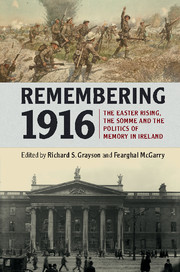Introduction
Published online by Cambridge University Press: 05 March 2016
Summary
I
The year 1916 witnessed two events that would profoundly shape both politics and commemoration in Ireland over the course of the following century. Although the Easter Rising and the Battle of the Somme were important historical events in their own right, their significance also lay in how they came to be retrospectively understood as iconic moments in the emergence of Northern Ireland and the Irish Republic. The historical memory of both events shaped not only the identities of the two states but the political communities within them, so much so that a necessary starting point for understanding their commemoration over the past century is to distinguish between the historical events themselves and the subsequent ways their significance has been constructed, mythologised and revised.
The Easter Rising provided a source of legitimacy not only for the independent Irish state that emerged out of the Irish revolution but for subsequent republican movements, whether seeking to acquire political power or to justify the use of violence for political ends. From the 1960s, the Rising's contested legacy also became increasingly central to acrimonious debates about the writing of Irish history which, unusually for a historiographical dispute, were given wide public purchase by the outbreak of the Troubles. Despite the success of the peace process over the past two decades, commemoration of the Rising continues to provoke as much division as unity, both North and South.
In Ulster, a different form of blood sacrifice, the fatalities endured by the 36th Division on the Western Front, especially on 1 July 1916 on the Somme, provided the central foundation myth for the Northern Irish state. As with the legacy of the Rising for republicans, the Somme represented a potent source of both political capital and intra-communal tension within unionist and loyalist political culture. Although long identified with one political tradition in the Irish commemorative landscape, as witnessed by the ubiquity of Somme imagery in loyalist murals, the aftermath of the Belfast/Good Friday Agreement has also witnessed the appropriation of the memory of the First World War to fashion a more conciliatory narrative of shared Catholic and Protestant experiences, a development bringing its own tensions in the North.
- Type
- Chapter
- Information
- Remembering 1916The Easter Rising, the Somme and the Politics of Memory in Ireland, pp. 1 - 10Publisher: Cambridge University PressPrint publication year: 2016



